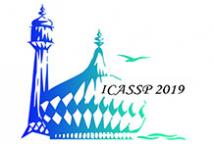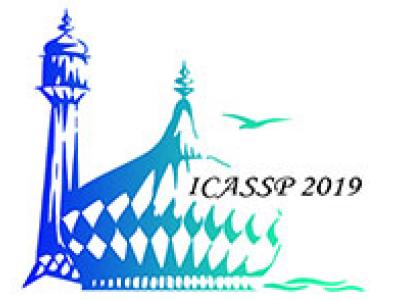
ICASSP is the world’s largest and most comprehensive technical conference focused on signal processing and its applications. The 2019 conference will feature world-class presentations by internationally renowned speakers, cutting-edge session topics and provide a fantastic opportunity to network with like-minded professionals from around the world. Visit website.

- Read more about ADMM-based Beamforming Optimization for Physical Layer Security in a Full-Duplex Relay System
- Log in to post comments
Although beamforming optimization problems in full-duplex communication systems can be optimally solved with the semidefinite relaxation (SDR) approach, its computational complexity increases rapidly when the problem size increases. In order to circumvent this issue, in this paper, we propose an alternating direction of multiplier method (ADMM) which minimizes the augmented Lagrangian of the dual of the SDR and handles the inequality constraints with the use of slack variables. The proposed ADMM is then applied for optimizing the relay beamformer to maximize the secrecy rate.
- Categories:
 40 Views
40 Views
- Read more about EARLY WILDFIRE SMOKE DETECTION BASED ON MOTION-BASED GEOMETRIC IMAGE TRANSFORMATION AND DEEP CONVOLUTIONAL GENERATIVE ADVERSARIAL NETWORKS
- Log in to post comments
Immediate and accurate detection of wildfire is essentially important in forest monitoring systems
•One of the most harmful hazards in rural areas
•For wildfire detection, the use of visible-range video captured by surveillance cameras are suitable
•They can be deployed and operated in a cost-effective manner
•The challenge is to provide a robust detection system with negligible false positive rates
•If the flames are visible, they can be detected by analyzing the motion and color clues of a video
- Categories:
 67 Views
67 Views
- Read more about SPATIALLY ADAPTIVE LOSSES FOR VIDEO SUPER-RESOLUTION WITH GANS
- Log in to post comments
ICASSP_PPT.pdf
- Categories:
 23 Views
23 Views
- Read more about Modeling Melodic Feature Dependency with Modularized Variational Auto-Encoder
- Log in to post comments
Automatic melody generation has been a long-time aspiration for both AI researchers and musicians. However, learning to generate euphonious melodies has turned out to be highly challenging. This paper introduces 1) a new variant of variational autoencoder (VAE), where the model structure is designed in a modularized manner in order to model polyphonic and dynamic music with domain knowledge, and 2) a hierarchical encoding/decoding strategy, which explicitly models the dependency between melodic features.
- Categories:
 22 Views
22 Views
- Read more about Incremental Binarization On Recurrent Neural Networks For Single-Channel Source Separation
- Log in to post comments
This paper proposes a Bitwise Gated Recurrent Unit (BGRU) network for the single-channel source separation task. Recurrent Neural Networks (RNN) require several sets of weights within its cells, which significantly increases the computational cost compared to the fully-connected networks. To mitigate this increased computation, we focus on the GRU cells and quantize the feedforward procedure with binarized values and bitwise operations. The BGRU network is trained in two stages.
- Categories:
 16 Views
16 Views
- Read more about EDUQA : EDUCATIONAL DOMAIN QUESTION ANSWERING SYSTEM USING CONCEPTUAL NETWORK MAPPING
- Log in to post comments
- Categories:
 45 Views
45 Views
- Read more about Deep Signal Recovery With One-Bit Quantization
- Log in to post comments
ICASSP2019.pdf
- Categories:
 240 Views
240 Views
- Read more about Multimodal One-shot Learning of Speech and Images
- Log in to post comments
Image a robot is shown new concepts visually together with spoken tags, e.g. "milk", "eggs", "butter". After seeing one paired audiovisual example per class, it is shown a new set of unseen instances of these objects, and asked to pick the "milk". Without receiving any hard labels, could it learn to match the new continuous speech input to the correct visual instance? Although unimodal one-shot learning has been studied, where one labelled example in a single modality is given per class, this example motivates multimodal one-shot learning.
- Categories:
 9 Views
9 Views
- Read more about MULTI-GEOMETRY SPATIAL ACOUSTIC MODELING FOR DISTANT SPEECH RECOGNITION
- Log in to post comments
The use of spatial information with multiple microphones can improve far-field automatic speech recognition (ASR) accuracy. However, conventional microphone array techniques degrade speech enhancement performance when there is an array geometry mismatch between design and test conditions. Moreover, such speech enhancement techniques do not always yield ASR accuracy improvement due to the difference between speech enhancement and ASR optimization objectives.
- Categories:
 16 Views
16 Views
- Read more about FREQUENCY DOMAIN MULTI-CHANNEL ACOUSTIC MODELING FOR DISTANT SPEECH RECOGNITION
- Log in to post comments
Conventional far-field automatic speech recognition (ASR) systems typically employ microphone array techniques for speech enhancement in order to improve robustness against noise or reverberation. However, such speech enhancement techniques do not always yield ASR accuracy improvement because the optimization criterion for speech enhancement is not directly relevant to the ASR objective. In this work, we develop new acoustic modeling techniques that optimize spatial filtering and long short-term memory (LSTM) layers from multi-channel (MC) input based on an ASR criterion directly.
- Categories:
 25 Views
25 Views